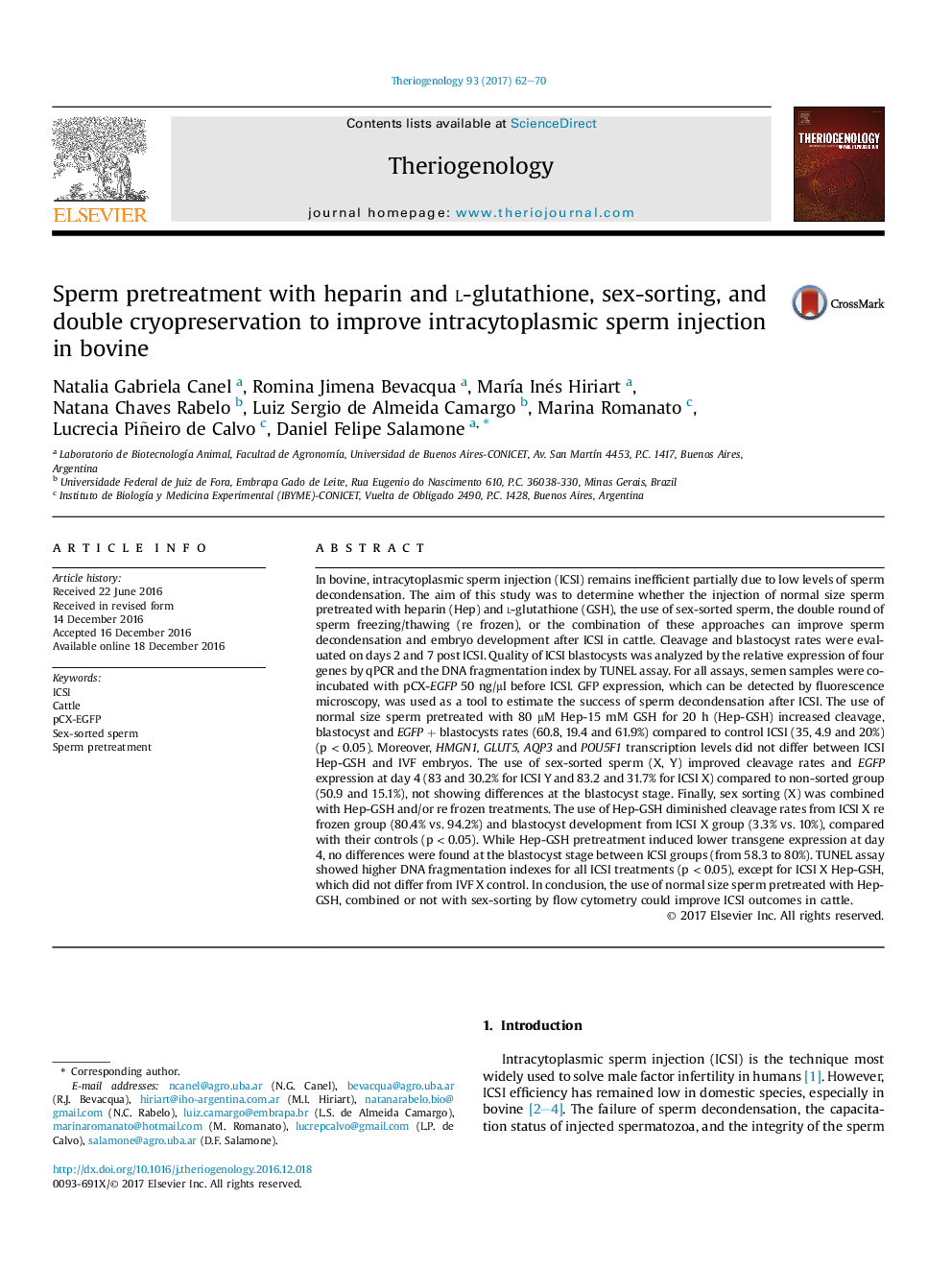| کد مقاله | کد نشریه | سال انتشار | مقاله انگلیسی | نسخه تمام متن |
|---|---|---|---|---|
| 5523506 | 1546076 | 2017 | 9 صفحه PDF | دانلود رایگان |
- Sperm pre-treatments influence ICSI outcomes in bovine.
- Non decondensed sperm treated with Heparin-Glutathione improves embryo development.
- Sex-sorting process facilitates sperm decondensation after ICSI.
- The combination of both pre-treatments diminishes blastocyst rates.
In bovine, intracytoplasmic sperm injection (ICSI) remains inefficient partially due to low levels of sperm decondensation. The aim of this study was to determine whether the injection of normal size sperm pretreated with heparin (Hep) and l-glutathione (GSH), the use of sex-sorted sperm, the double round of sperm freezing/thawing (re frozen), or the combination of these approaches can improve sperm decondensation and embryo development after ICSI in cattle. Cleavage and blastocyst rates were evaluated on days 2 and 7 post ICSI. Quality of ICSI blastocysts was analyzed by the relative expression of four genes by qPCR and the DNA fragmentation index by TUNEL assay. For all assays, semen samples were co-incubated with pCX-EGFP 50 ng/μl before ICSI. GFP expression, which can be detected by fluorescence microscopy, was used as a tool to estimate the success of sperm decondensation after ICSI. The use of normal size sperm pretreated with 80 μM Hep-15 mM GSH for 20 h (Hep-GSH) increased cleavage, blastocyst and EGFP + blastocysts rates (60.8, 19.4 and 61.9%) compared to control ICSI (35, 4.9 and 20%) (p < 0.05). Moreover, HMGN1, GLUT5, AQP3 and POU5F1 transcription levels did not differ between ICSI Hep-GSH and IVF embryos. The use of sex-sorted sperm (X, Y) improved cleavage rates and EGFP expression at day 4 (83 and 30.2% for ICSI Y and 83.2 and 31.7% for ICSI X) compared to non-sorted group (50.9 and 15.1%), not showing differences at the blastocyst stage. Finally, sex sorting (X) was combined with Hep-GSH and/or re frozen treatments. The use of Hep-GSH diminished cleavage rates from ICSI X re frozen group (80.4% vs. 94.2%) and blastocyst development from ICSI X group (3.3% vs. 10%), compared with their controls (p < 0.05). While Hep-GSH pretreatment induced lower transgene expression at day 4, no differences were found at the blastocyst stage between ICSI groups (from 58.3 to 80%). TUNEL assay showed higher DNA fragmentation indexes for all ICSI treatments (p < 0.05), except for ICSI X Hep-GSH, which did not differ from IVF X control. In conclusion, the use of normal size sperm pretreated with Hep-GSH, combined or not with sex-sorting by flow cytometry could improve ICSI outcomes in cattle.
Journal: Theriogenology - Volume 93, 15 April 2017, Pages 62-70
